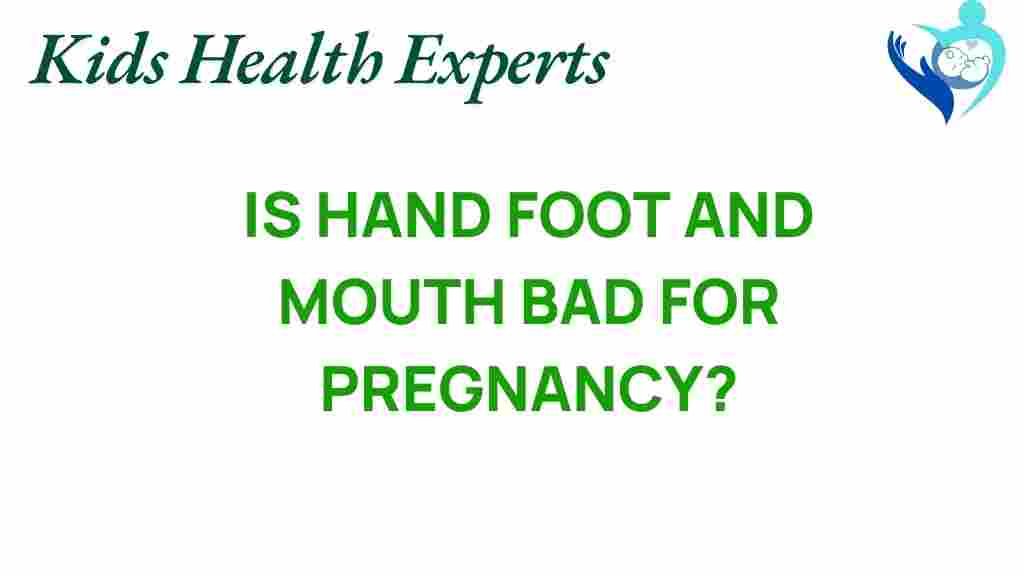The Hidden Risks: Is Hand, Foot, and Mouth Disease Dangerous During Pregnancy?
Hand, Foot, and Mouth Disease (HFMD) is a viral infection that primarily affects young children, manifesting through symptoms such as mouth sores, rashes, and fever. However, many expectant mothers wonder about the implications of this disease on their pregnancy and the potential risks it may pose to both maternal and infant health. In this comprehensive article, we will explore the symptoms, treatment options, and safety measures related to HFMD during pregnancy.
Understanding Hand, Foot, and Mouth Disease
Hand, Foot, and Mouth Disease is most commonly caused by coxsackievirus, a member of the enterovirus family. This contagious disease spreads through direct contact with an infected person’s saliva, blister fluid, or respiratory droplets. While HFMD is prevalent in children under five, adults, including pregnant women, can also contract the virus.
Symptoms of Hand, Foot, and Mouth Disease
The initial symptoms of HFMD often mirror those of a common cold. Here are the typical symptoms to watch for:
- Fever
- Sore throat
- Loss of appetite
- Mouth sores
- Rash on hands and feet
- Irritability in infants and toddlers
If you experience these symptoms during pregnancy, it’s crucial to consult your healthcare provider for further evaluation.
Risks of Hand, Foot, and Mouth Disease During Pregnancy
One of the primary concerns for pregnant women contracting HFMD is the potential impact on maternal health and the developing fetus. Here are some important considerations:
1. Maternal Health Risks
While HFMD is generally mild and self-limiting, it can lead to complications in pregnant women, such as:
- Dehydration: Mouth sores can make it painful to eat or drink, leading to dehydration.
- Secondary infections: Open sores may become infected, requiring medical intervention.
2. Risks to the Fetus
Research on the effects of HFMD on fetal development is limited. However, some studies suggest:
- There is no strong evidence linking HFMD to serious birth defects.
- In rare cases, severe infections in the mother could potentially lead to complications such as preterm labor.
How to Diagnose Hand, Foot, and Mouth Disease
Diagnosing HFMD typically involves a physical examination and medical history review. Your healthcare provider may look for:
- Characteristic rashes and sores
- Fever and other symptoms
In most cases, lab tests are not necessary unless the diagnosis is unclear.
Treatment Options for Hand, Foot, and Mouth Disease
Currently, there is no specific antiviral treatment for HFMD. Management focuses on relieving symptoms and ensuring the comfort of the affected individual. Recommended treatment options include:
- Hydration: Encourage fluid intake to prevent dehydration. Offer water, electrolyte solutions, or soothing cool liquids.
- Pain relief: Over-the-counter pain relievers, such as acetaminophen or ibuprofen, can help alleviate fever and discomfort.
- Mouth rinses: Saltwater rinses or mouthwashes can help ease mouth sores.
Always consult your healthcare provider before taking any medication during pregnancy.
Preventing Hand, Foot, and Mouth Disease
Preventing HFMD is especially important for pregnant women. Here are some effective safety measures:
- Good hygiene practices: Wash hands thoroughly with soap and water, especially after changing diapers and before meals.
- Avoid close contact: Steer clear of individuals showing symptoms of HFMD, particularly children.
- Disinfect surfaces: Regularly clean toys, surfaces, and items that may carry the virus.
For more information on hygiene practices, check this link.
Troubleshooting Tips for Expecting Mothers
If you suspect you have contracted HFMD during pregnancy, here are some troubleshooting tips:
- Monitor symptoms: Keep track of your symptoms and seek medical advice if they worsen.
- Maintain hydration: If sore throat makes it difficult to drink, try ice pops or cold liquids.
- Rest: Ensure you get plenty of rest to help your body recover.
When to Seek Medical Attention
In most cases, HFMD resolves on its own without serious complications. However, seek immediate medical attention if you experience:
- Severe dehydration signs (e.g., dry mouth, reduced urination)
- High fever that does not respond to medication
- Worsening symptoms or the development of new symptoms
Conclusion
In summary, while Hand, Foot, and Mouth Disease can be concerning for pregnant women, the overall risks to maternal and fetal health appear to be low. By understanding the symptoms, treatment options, and preventive measures, expectant mothers can take proactive steps to safeguard their health and the health of their infants. Always consult with your healthcare provider for personalized advice and guidance during your pregnancy.
For more information on maternal health and safety during pregnancy, visit this resource.
This article is in the category Conditions and created by KidsHealthExperts Team
